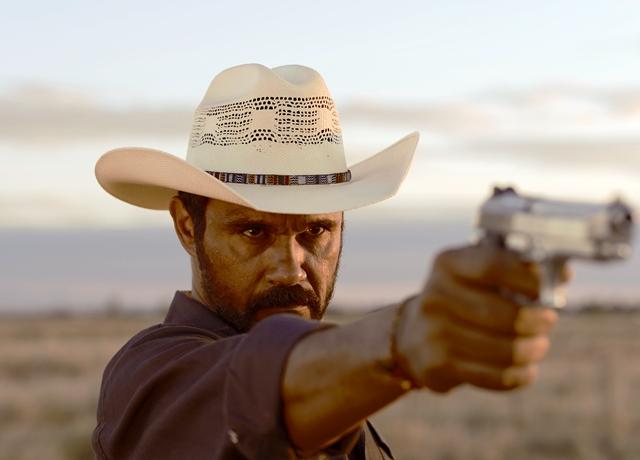Returning to the small town you grew up in after a spell in the big city can often be problematic. Old friends now think you’re a big shot. The familiar is seen in a new light, and not necessarily a good one. There’s a sense that the ties which have been slackened might be irrevocably sheared. In Mystery Road, Aaron Pedersen’s Jay Swan is a cop back in outback Queensland, in north-east Australia, after training. Now a detective, he quickly finds it’s sink or swim.
But that’s not his only problem. As an Aboriginal, he’s subjected to racism. He’s one of what’s called “this dark breed.” And as a policeman, he’s regarded with suspicion by the local native population. His marriage is also on the rocks. If all that weren’t enough, he’s told there are “lots of drugs and shit going on.”
 The square-peg outsider pitching up into a round-hole bad lot is a film staple, but where Mystery Road makes its mark is with Pedersen’s brooding, taciturn and sometimes unreadable presence, and director Ivan Sen’s deftly rendered setting. Like Swan, this version of the outback is appropriately desiccated. The air is heavy and threatens to break, like a sudden storm. (pictured right: Hugo Weaving as Johnno and Aaron Pedersen as Swan)
The square-peg outsider pitching up into a round-hole bad lot is a film staple, but where Mystery Road makes its mark is with Pedersen’s brooding, taciturn and sometimes unreadable presence, and director Ivan Sen’s deftly rendered setting. Like Swan, this version of the outback is appropriately desiccated. The air is heavy and threatens to break, like a sudden storm. (pictured right: Hugo Weaving as Johnno and Aaron Pedersen as Swan)
With Swan, Pedersen adopts the quiet-man persona familiar from westerns – Sen has acknowledged this is a take on the western. But Pedersen could also substitute for Warren Oates' nameless street racer outsider in Monte Hellman’s early Seventies loners-on-the-road film Two-Lane Blacktop. Mystery Road does have the feel of Hollywood’s edgier films from four decades ago, when outsiders were frequently metaphors for a society ill at ease with itself.
An outsider isolated from the racist police force he works for, Swan is told by his sergeant not to get in anyone's way. This immediately becomes a problem as he starts investigating the murder of a teenage Aboriginal girl.
With no help from colleagues and a growing outright resistance to his probing, he soon ties her life to drugs and prostitution, both fostered by corruption within the force. His oily colleague Johnno (Hugo Weaving) oscillates between being seemingly helpful and threatening. However much he tries, Swan cannot escape the orbit of Johnno’s creepy, unpredictable character.
 Swan encounters intimidating locals, an underworld network of which the police are aware but which they tolerate and a string of odious characters who may or may not be to do with what he is investigating. His daughter seems involved
Swan encounters intimidating locals, an underworld network of which the police are aware but which they tolerate and a string of odious characters who may or may not be to do with what he is investigating. His daughter seems involved
Mystery Road‘s obliqueness may frustrate. Little is explained and the film is filled with encounters and situations which do not develop. The landscape is said to be teeming with wild dogs, but none are seen despite a character improbably saying that, at distance, he has seen one running with a human bone in its mouth. When Swan finally brings the drug gang and their acolytes - surely the real wild dogs - together at the film’s violent climax (pictured above left), it’s impossible to determine who relates to who.
Yet this doesn’t matter. The powerful Mystery Road is about its slow-burn atmosphere and Pedersen’s precise rendering of Swan. A sense it is rooted in a reality is also a stark reminder that Australia has an underbelly which isn’t going to appear in any tourist brochures.
Overleaf: Watch the trailer for Mystery Road
Watch the trailer for Mystery Road















Add comment